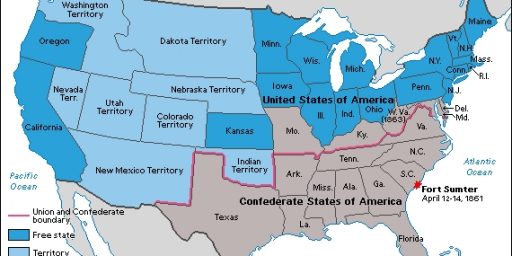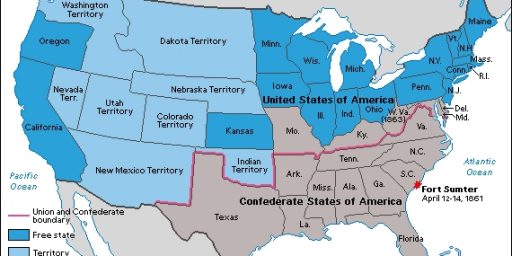Splitting States
While polarization in our national politics gets the most attention, several states also face serious rural-urban tensions.

Dave Schuler reflects on the politics of his state:
I see that there’s a movement to split downstate Illinois from the Chicago area. However dissed the downstates feel that wouldn’t leave a viable state. Of Illinois’s ten largest cities, six are part of the Chicago metropolitan area and an even larger share of the state’s domestic product. Outside the Chicago metropolitan area, the state’s largest city is Rockford at 150,000. Downstate would not be Indiana. It wouldn’t even be Iowa.
In the ensuing discussion, he remarks:
I don’t think that party politics is the reason for a separatist movement in Illinois but the sense in downstate Illinois that Chicago’s interests are not their interests. The sense in Chicago is that Mike Madigan’s interests are not Chicago’s interests.
In a 2013 essay explaining “Why it’s so hard for states to break up,” Jon Terbush observes,
There have been hundreds of efforts to split states since America’s founding, but only a handful have proven successful, none in the past 150 years. Maine, Kentucky, and Tennessee all owe their founding to secession, as does West Virginia, which during the Civil War became the last state to secede its way into existence.
The U.S. Constitution sets a high bar for secession efforts. Article IV, Section 3 mandates that would-be new states must first win approval from the state or states they are trying to abandon. The U.S. Congress must then vote to approve the new state before it can be admitted into the nation.
Given that disagreements with state capitols are the primary spark for secession movements, there is little chance separatists could win that first round. If a secession vote were to somehow make it all the way to the U.S. Congress, it’s hard to imagine lawmakers there diluting their power by adding two more senators who would likely represent a tiny sliver of the nation.
The practicalities of splitting, though, interest me far less than the motivation. In most cases, it’s the same one that Dave identifies in Illinois: a sense from the major metropolitan area that they’re paying far more than their fair share while getting outvoted by the rural hicks and a sense from the rest of the state that the urban center is corrupt and too powerful.
We don’t have anything like a Chicago in Virginia, where I have lived the past sixteen-plus years, but there’s definitely a similar tension between the Northern Virginia exurbs of DC and the rest of the state. We’re far richer per capita than our southern co-residents, yet our interests are distinct. Without us, they’re very much the Old South; with us, the Old Dominion has become a purple state, if not a blue one. We disproportionately fund the state, its infrastructure, and its colleges and universities and generally feel that we’re not getting our fair share. Meanwhile, they resent our demands for more money to bolster our inadequate road and rail networks.
Interestingly, although Kentucky and West Virginia were both formed wholly out of parts of the Commonwealth, there are no active proposals for further splits today. I have seen calls over the years from pundits to form a New Columbia or such from DC and its suburbs and exurbs in Maryland and Virginia, but no serious movements have come from the idea.
Interestingly, Dave remains a much stauncher supporter of old-style federalism than me. Despite what he sees as the terrible corruption of his city of Chicago and the broken relationship between it and Springfield, he far prefers dealing with issues locally rather than nationally. Of course, many of those same issues extend into our national politics as well.






What sort of vote? Simple majority?
Malcolm Gladwell made a big deal about splitting up Texas in an episode of his podcast last year, claiming Congress had already approved it when Texas joined the union.
His motivation is that the most of the resulting states would be as blue as the sky. Which, by a weird coincidence, would be what keeps the GOP-dominated government in Texas from splitting the state up.
I can’t help but point out that politics is far more ephemeral than geography. This fact can be used to argue it should be easy to split states up, or to argue the opposite. My argument is to cut through the Gordian knot and point out the obvious: if splitting up states were easy, you’d wind up with well over a hundred states in short order, maybe even two hundred.
The upside of that (remember, every silver lining has a cloud and viceversa) is that it would finally give an irresistible impulse to increase the size of the House. it wouldn’t do to have, say 350 Senators for a mere 438 Representatives.
Ha. I grew up in Upstate New York, so I’ve seen this tension in spades.
And with more mechanised farming and the continued rule of Big Ag, I suspect it’s only going to get worse and worse. The rural parts of the US are getting hollowed out. Not enough farmers to support the other services–such as doctors, lawyers, etc. Heck, with the lack of the tax base they can’t even support the legal and policing infrastructure.
This is why I call Kansas “a green desert.”
@Kit:..What sort of vote?
The Constitution does not say “vote” it says “consent”.
Supreme Court Justice Bluster will let you know what that means as soon as Sleepytown is named the Capital of Southern Illinois.
@Mister Bluster:
I’ve made that very point many times in the past. In downstate Illinois there is a myth that Chicago receives more than its fair share of state tax revenues where actually it’s the opposite—it receives less. The myth persists nonetheless.
As I note in my post I think the reality is that downstate is correct in that it doesn’t receive enough attention but, then, neither does the Chicago metropolitan area. We’re all just pawns in Mike Madigan’s master plan (whatever that may be).
You often hear a lot of talk of splitting states, but rarely do you ever hear any talk of merging. A few years ago, some folks wanted to form the state of Northern Colorado. They didn’t want to become part of WY or NE.
I think that’s very telling.
[Moved to Open Forum-ed]
I grew up in Illinois. Downstate, the nonChicago parts, seemed unpromising when I was young, and I left. The last several decades have proved me right. Farming has become corporate, and it employs 1.5% of the population compared to 4.4% in 1970. Manufacturing in Illinois is best reflected by Caterpillar which has recently decided to move its headquarters to Deerfield, IL, in the Chicago area. Illinois lost 45,000 residents in 2017-18 with the Chicago area losing 13,000; downstate is losing people faster than Chicago. Illinois without Chicago would be a good opportunity to create a large park recreating the primeval prairie.
Likewise for many other states the urban center provides the economic growth that sustains the state. There is simply too little activity that can be generated in a rural area. Ohio without Cleveland and Columbus or Indiana without Naptown would be West Virginia.
@Dave Schuler:
Myths. The true immortals.
The most prevalent myth in Mexico city is that the car tax (tenencia), was established in the late 60s to finance the 1968 Olympics, and that it was supposed to be temporary.
Not true, and not true.
But it was about as popular as Dennison at the Democratic Convention. So a few years ago, after decades of very loud complaints, it was changed. Now your’e charged a “renewal fee,” and are given a “subsidy” (really a discount) for the actual payment, provided you pay in the first quarter.
I have lived in downstate Illinois most of my life and do now. The arguments about separating Chicago from downstate (which would include areas like Rockford that are west and somewhat north of Chicago) have gone on as long as I can remember for any number of reasons, and are never going anywhere. I do think, however, you could get up a pretty large consensus to separate Mike Madigan’s legislative district from the rest of the state.
@Kathy:
I was really hoping that you were going to write that not only was the tax renamed a renewal fee, but that its official reason was to pay off the 1968 Olympics. And that it was now permanent.
I have no problem with a degree of federalism and localism in theory. Unfortunately the way we do it – a mix of absurdly mismatched states – is paralyzingly dysfunctional. It isn’t cute that empty states with no people and no income and no reason to exist still exert an unfair degree of influence, it’s anti-democratic and destabilizing. It’s backward, it’s retarding, it’s ridiculous on its face and were we to start over fresh tomorrow there is no way any of the existing states could rationalize its existence. But as always, we have to pay the price for 18th century slave drivers. The dead hand of the South still grips the nation’s throat.
You want federalism? It should be based on population centers. Obviously. Los Angeles is a thing, Wyoming is not. New York City is a thing, North Dakota is not. Arkansas? WTF is Arkansas? Why does Arkansas get two senators and the Tampa metro area, with the same population, gets a sliver of a senator? It is irrational. Getting rid of the EC is just a start.
But our clever Founders have locked us into a now-obsolete formula. We are in a constitutional trap, held hostage by lines on a map containing nothing but cows.
The writer at Schuler’s link lists his grievances:
I have no idea what the 4th Amendment reference means, but it looks like it’s the usual FOX News (sic) culture war stuff, nothing substantive.
And how do they deal with Champaign County (University of Illinois) which is unlikely to want to join their silliness? Designate I57 a sort of Danzig Corridor?
I have no idea what the 4th Amendment reference means, but it looks like it’s the usual FOX News (sic) culture war stuff, nothing substantive.
And how do they deal with Champaign County (University of Illinois) which is unlikely to want to join their silliness? Designate I57 a sort of Danzig Corridor?
I know you know this.
But I’ll say it again for anyone who reads these threads and has the fantasies.
It’s not going to happen!
@Kit:
It’s been permanent all my life. In its last years whole, dealers offered to cover it for the first two years.
BTW, I meant the discount is for the actual tax, you still pay the renewal fee. But that’s a fraction of the tax
@Michael Reynolds:
I agree that the system designed for the issues of 1789 are archaic and long have been. But Dave and I are talking about the flip side of federalism: having the preponderance of issues decided at the state and local level. In theory, it makes a lot of sense to let California be California and Arkansas be Arkansas. But there are some real issues with representativeness even at that level.
@James Joyner:
Letting states be states is what gave us the Civil War. It became apparent that the country could not survive half-slave and half-free, in part because slave states insisted they had a right to impose their rules on free states – including censorship of the mail and the recapture of escaped slaves. (States gave us the Mexican war as well, since the underlying issue was the extension of the slave power into new territories.)
It is simply ridiculous to have an American citizen be able to do something in State A that is perfectly legal, while in State B he’d go to prison. Rather than being elevated by state experimentation we are far more often dragged down by states.
Schuler’s example of Illinois state and Chicago metro makes my point: the state of Illinois is a millstone around Chicago’s neck, yet Chicago has to bend the knee to downstate goobers. Illinois makes zero sense as a political unit, it can’t even reconcile Chicago and Cairo, which does not to my mind recommend it as an example of the wonders of federalism. As a mental exercise, try to name the states that would be net better off without their major metro area. Then, try the reverse.
The state is archaic, it’s a relic of white power and it doesn’t even make sense within its own territory. I recognize we’re stuck, but recognizing we’re stuck doesn’t make this OK. It’s not OK, we should have one person, one vote, period. Set up a system of administrative départements, like the French have.
@Dave Schuler:
Myths persist, but isn’t this how it destined to work with localism? Unmovable by any evidence to the contrary, it’s typical (and likely human nature) for each local entity to believe it is being taken advantage of by some other outer entity. Nations are put upon by other nations, states by other states, urban regions by rural ones – hell, I suspect my HOA thinks the neighboring HOA is getting more than its share of the local rainfall.
Fully acknowledging the Sisyphean task in asking people to put others’ interests on equal footing with, let alone above, their own, it is simply true that greater efficiency, and therefore prosperity, requires people working together on a common good.
Us against Them is zero sum competition by definition.
The fine folks in eastern Washington vote Republican, and yet nd up with two Democratic Senators, and a Democratic Governor. They are convinced that all their tax money goes to Seattle to pay for needle exchanges.
I would really like to make eastern Washington western Idaho. I think the people there would be happier. Or at least that they would get what they vote for.
And it wouldn’t affect the Senate, so there wouldn’t be a reason for the national politicians to block it.
I’m not sure how the people of eastern Washington would really feel about it though… I suspect their grumblings are just to be able to grumble.
@Scott F.:
That’s more of a best case scenario than a definition.
Us against Thm usually has a lot of waste, and poor decisions. It’s a net negative in practice.
@Slugger:
“Ohio without Cleveland and Columbus or Indiana without Naptown would be West Virginia.”
Or as James Carville said about Pennsylvania, there’s Philadelphia at one end, Pittsburgh at the other, and Alabama in between.
The situation with secession in Washington seems to be the complete opposite. In Washington the “non-Pugetropolis” counties have been the one’s seeking a separate state for a couple of decades now. It’s just as impractical, but I do get the frustration of living in a state where Metro Seattle’s population of just under half of the total for the state (3.5 of 7.5 million total) means that if Seattle doesn’t want something or Seattle doesn’t benefit from it, it doesn’t happen. Conversely, if Seattle does want something (say a billion and a half of corporate welfare for the owners of sports franchises, for example) it doesn’t matter what the rest of the state wants.
It’s a problematical issue. Korea has been able to solve this problem by creating what are called “metropolitan cities” that are carved out of their provinces when they reach populations that can outvote the balance of the province, and having these cities administered by a combination of home rule and national administration. With maybe as many as 100 (?) such cities possible, I don’t think it would work in the US, and it won’t work much longer in Korea with 8 right now and 5 more that could be added, but we may need some sort of plan beyond telling the residents of less populated areas to STFU and move to the city if they don’t like it.
As a life long Chicagoan, I love the shocked look on people’s faces when I wholeheartedly agree with the secessionists on this. The don’t seem to get that, even with all the financial problems Chicago/Cook County has, Downstate would rocket to the bottom and Chicago would float to the top. Especially if we got the Collar Counties. The part of that study that talks about DuPage County getting next to nothing probably answers how we get them on board.
The secessionists don’t seem to understand that Chicago would be come a geographically compact, very rich state and they would be left with an enormous very poor state. Enjoy fixing those roads with all your guns.
I also agree that Mike Madigan should be locked in a box with Jeanne Ives and launched into the Lake. It’s bloodthirsty, but it would solve a lot of problems.
@Nick: The Down State would also get two Senators, and we have enough empty states.
Just give the secessionists to Indiana or something.
@Dave Schuler: Yeah I’ve heard all kinds of people including family repeat that myth during my nearly 30 years of time spent living in Illinois. “If only we’d get rid of them tax and spend all our money Chicago DemoncRats we’d be a prosperous state!!!”
@Slugger: It took me a bit longer to realize how much of a dead end my town in Illinois was.
@Michael Reynolds: You can have states without having 50 traffic codes or 50 criminal laws. Or even without having the same number of senators for each state regardless of population.
@Scott F.:
It’s inherent in pie cutting that there’s no way to do it so that someone who’s determined to do so can’t claim it’s unfair. My county didn’t get as much, the slices are the same size but ours has more crust, yours was hotter/cooler, as much per capita/per household/per acre/per student/per town/per traditional farmer, as much as we need, enough to make up for your cut last time, doesn’t reflect the virtue of our corn production, we’re the common clay of the new West.
And what did the Romans ever do for us anyway?
Also likewise for the country as a whole in the dynamic between most blue and red states…
Hmm…now why would that comment be placed in the moderator queue…..
@Just nutha ignint cracker:
Are the counties seriously seeking a separation or is it just a few loud mouths pushing it? As Gustopher said, “I suspect their grumblings are just to be able to grumble”. Some of my coworkers always have something to complain about because they seem to enjoy complaining.
@Scott O: Considering that it’s been going for 30 or so years that I can remember and that a ballot initiative is not that hard to validate here, I think it’s just conservatives/libertarians stirring up the rubes mostly. The governments in the individual counties would be able to pull this off if they really wanted it, but they have the whole “dog chasing a car” thing down.